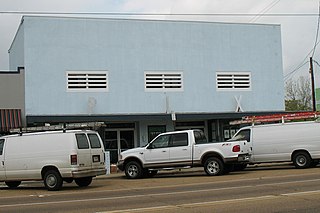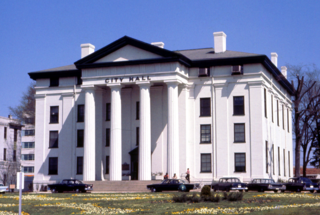
A Time to Kill is a 1989 legal thriller and debut novel by American author John Grisham. The novel was rejected by many publishers before Wynwood Press eventually gave it a 5,000-copy printing. When Doubleday published The Firm, Wynwood released a trade paperback of A Time to Kill, which became a bestseller. Dell published the mass market paperback months after the success of The Firm, bringing Grisham to widespread popularity among readers. Doubleday eventually took over the contract for A Time to Kill and released a special hardcover edition.

WLBT is a television station in Jackson, Mississippi, United States, affiliated with NBC. It is owned by Gray Television, which also operates American Spirit Media–owned Fox affiliate WDBD and Vicksburg-licensed MyNetworkTV outlet WLOO under shared services agreements (SSAs). WLOO's license is owned by Tougaloo College, with American Spirit actually operating the station through a separate joint sales agreement (JSA); in turn, Gray provides WLOO with limited engineering support. The stations share studios on South Jefferson Street in downtown Jackson, while WLBT's transmitter is located on Thigpen Road southeast of Raymond, Mississippi.

WAPT is a television station in Jackson, Mississippi, United States, affiliated with ABC. The station is owned by Hearst Television and maintains studios and transmitter facilities on Channel 16 Way in southwest Jackson.

Jackson Academy is a private school in Jackson, Mississippi founded by Loyal M. Bearrs in 1959. Bearrs claimed he established the school to teach using an accelerated phonics program he developed, but the school remained completely racially segregated until 1986, even forgoing tax exemption in 1970 to avoid having to accept Black students.
WMPR is a radio station broadcasting a variety format. WMPR is a community station which specializes in gospel and blues but also features other forms of music as well as several community-oriented talk shows. Licensed to Jackson, Mississippi, United States, the station serves the Jackson area. The station is currently owned by J.C. Maxwell Broadcasting Group, Inc.

The Pix/Capri Theatre is a historic movie theater in Jackson, Mississippi.

This is a list of the National Register of Historic Places listings in Copiah County, Mississippi.

Mississippi Department of Archives and History (MDAH) is a state agency founded in 1902. It is the official archive of the Mississippi Government.

Jackson City Hall, located in Jackson, Mississippi, is the seat of municipal government.

The Mississippi Center for Public Policy (MCPP) is a free-market, conservative think tank located in Jackson, Mississippi. The organization's stated mission is "To advance the constitutional ideals of liberty and justice for all Mississippians by employing an evidenced-based approach to public policy whereby we advocate for and advance real conservative ideas with policy makers, members of the media, business leaders, the academic community, and private citizens."

The Lamar Life Building is a historic building in Jackson, Mississippi, USA. It was designed in the Gothic Revival architectural style, and it was completed in 1924. It is the twelfth tallest building in Jackson, and was considered Jackson's first skyscraper. The architects were Sanguinet, Staats & Hedrick of Fort Worth, Texas in association with Jackson architect Noah Webster Overstreet.

Chokwe Antar Lumumba is an American attorney, activist, and politician serving as the 53rd mayor of Jackson, Mississippi, the 7th consecutive African-American to hold the position. In 2024, he and some other officials in the state were indicted on corruption charges.
For the state pageant affiliated with Miss Teen USA, see Miss Mississippi Teen USA
Claude H. Lindsley was an American architect based in Mississippi.
This is a list of protests related to the murder of George Floyd in Mississippi, United States.
On January 13, 2019, George Robinson, a 62-year-old Black man, died two days after a violent arrest by three Black police officers in Jackson, Mississippi. According to a grand jury indictment, the officers pulled Robinson out of a car, threw him headfirst into the pavement, and struck and kicked him multiple times in the head and chest. Robinson was treated at the scene but within hours lost consciousness and later died at a hospital. The state coroner ruled the death a homicide.
The Heidelberg Hotel was a hotel in Jackson, Mississippi, which operated from 1922 to 1974. The hotel was notable for several firsts: the first fireproof building in Mississippi and the first hotel to break the state's colour barrier in 1964 in reversing its policy to allow African-Americans to book hotel rooms. Other local hotels followed shortly thereafter. The hotel was also the site of John F. Kennedy's first speech in the southern United States in 1957, and senators Joseph S. Clark and Robert F. Kennedy visited the hotel in 1967 when on a fact-finding tour of the Mississippi Delta.

The 2021 mayoral election in Jackson, Mississippi took place on June 8, 2021, alongside other Jackson municipal races. Primary elections took place on April 6, and the primary runoff was scheduled on April 27. Incumbent mayor Chokwe Antar Lumumba was re-elected to a second term in office with 69.1% of the vote.

Jackson/Hinds Library System (JHLS) is the public library system of Jackson and Hinds County in Mississippi.

The A.G. Gaston Motel is a historic building and former motel in Birmingham, Alabama. In 1963 during the Civil Rights movement, the Southern Christian Leadership Conference used a room in the hotel as their headquarters, which was later bombed by terrorists.
















